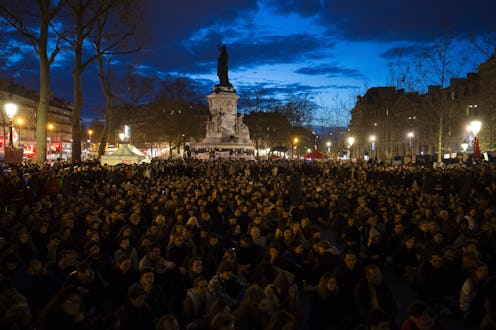News
ISIS Planned To Strike France A Second Time
In the wake of two terrorist attacks in Paris, France, in January and November 2015, and a recent attack in Brussels, Belgium, the Associated Press reported that the extremists who hit Brussels in March and killed 32 people had in fact planned a second strike for France. France is widely believed a romantic place, where tourists and travelers honeymoon and sip coffee in cafes on cobblestone streets; but for those in France, the cultural history is quite complex, going back a long way. The French are not far-removed from extremist terrorism, and these attacks and threats on France are occurring more frequently — why is this?
For one, the Islamic State — who claimed responsibility for the attacks — has long disliked the city of Paris, calling it "the capital of prostitution and vice" in a statement following the November incident. Extremist Islam preaches archaic misogyny in its philosophy, so a city so openly accepting of sexuality necessarily conflicts with the inherent chaste discrimination to which ISIS is so bound. The terrorist group noted that France and "all nations following in its path" are "at the top of the target list for the Islamic State."
Secondly, although the United States is probably the Islamic State's number one target, both distance and security measures make it harder for terrorist operatives to enter the country.
France, however, may serve as a proper runner-up, with its western progressivism and similarities to the U.S., including its sometimes violent engagement with the Muslim world. This is speculative, of course, as ISIS may simply have chosen where they carry the best advantage, especially with the potential for recruiting new members due to France's proximity to the Middle Eastern countries where the Islamic State is strongest. Some of the ISIS operatives were identified as French citizens after the attacks.
Modern France has attempted to put forth a strong tradition of opposition to organized religion — particularly in Paris, the nation's largest city. Some in the country have openly embraced satirical humor when regarding religion; Charlie Hebdo is exemplary of this, as the satirical publication was a target for al Qaeda operatives in January 2015.
But tensions have increased between France's Muslim community and other communities over time, and these persisted and increased through the launching of airstrikes on ISIS targets in Syria in September 2015. Many in the community are resentful to the French president, Francois Hollande, under whom the strikes were approved.
Although the attacks against extremism are widely popular — especially for right-wing individuals in both France and the U.S. — hopefully France and nations around the world can continue the fight against terrorism without conflating that fight with the beliefs of innocent people. Terrorists will commit terror no matter the scenario, but scorned and hurt people joining their leagues is avoidable.
